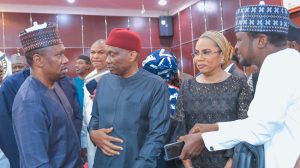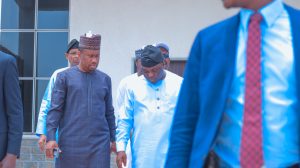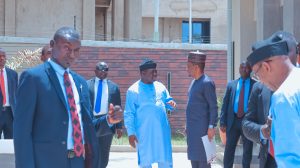News
Governors back state police as NEC defers talks until January
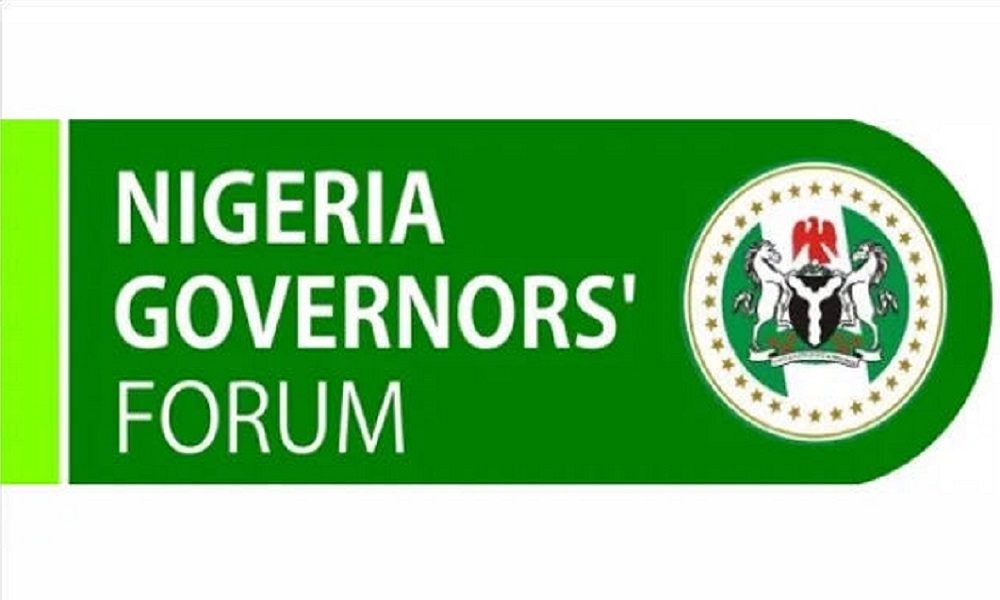
All 36 states have submitted their positions on State Police, with a majority agreeing on the need for state-controlled policing.
The Governor of Kaduna State, Uba Sani, revealed this to State House Correspondents after the 147th meeting of the National Economic Council at the Aso Rock Villa, Abuja, on Thursday.
He said, “Today, one of the discussions we had at the NEC meeting was the update on the creation of state police. As you are aware, there was a submission by states toward the establishment of state police.
“36 states have submitted, minus FCT. FCT is not a state. They explained why they had not submitted it. But 36 states have all submitted their own position on state police.
“From what is available, virtually most of the states are in agreement with the establishment of state police in Nigeria. I want to say here clearly that most of us are in agreement with the establishment of State Police.”
The Kaduna State Governor explained that the consensus stemmed from various security challenges across states.
He highlighted the central issue of ungoverned spaces in Nigeria and the acute shortage of security personnel, including the police, army, and other relevant agencies, which are unable to cover all areas adequately.
“That is why most of us agreed that the establishment of state police in Nigeria is the way forward toward addressing the problem of insecurity in our own country,” he stated.
However, the Council deferred final discussions until January, when a detailed report from the NEC secretariat will be presented for deliberation.
“But today, the Council decided to step down the discussion until the next council meeting because we need to come up with a report from the secretariat. After the report, there will be deliberation at the next NEC meeting, which will likely take place in January.
“Not only that. There was also a resolution in the last NEC meeting, which today the secretariat agreed on, stating that there will be further stakeholder engagement after the panel and deliberation by the members of the NEC.”
At its 146th meeting on November 21, the Council gave Adamawa, Kebbi, and Kwara States and the FCT one week (November 28) to submit their positions on the proposed creation of state police.
“The Council mandated these remaining states and FCT to make their submissions within the next one week,” the Bayelsa State Governor, Mr Duoye Diri, told State House Correspondents.
Diri said the three states and the nation’s capital are the only entities yet to submit reports out of the 36 states.
On February 15, 2024, the Federal Government, alongside the 36 states, began talks expected to culminate in the creation of state police.
This formed part of agreements reached at an emergency meeting between President Bola Tinubu and state governors at the Aso Rock Villa, Abuja.
It followed the pockets of insecurity recorded nationwide, hikes in food price,s, and economic hardship.
Addressing State House Correspondents afterward, the Minister of Information and National Orientation, Mohammed Idris, explained that the process was still in its infancy and would only take shape after more deliberations between stakeholders.
“The Federal Government and the state governments are mulling the possibility of setting up state police,” said Idris, adding that “this is still going to be further discussed.”
He explained, “A lot of work must be done in that direction. But if our government and the state governments agree to the necessity of having state police, this is a significant shift.”
Two days earlier, the House of Representatives said it was considering a legislative bill titled, ‘A bill for an Act to alter the constitution of the Federal Republic of Nigeria, 1999, to provide for the establishment of State Police and related matters.’
Following this agreement, the National Economic Council requested each state to submit detailed reports outlining their positions and plans for implementing state police. By March 2024, 16 states had submitted their reports, with the remaining 20 expected to do so by May.
In April 2024, the Nigeria Governors’ Forum announced that the decisions of the remaining 20 governors were ready for submission to the NEC, indicating a unified commitment among the states to establish state police forces.
Despite these, as of the last NEC meeting, the implementation of state police remains only in the planning stages as the FG and state authorities continue to haggle on the constitutional amendments required to empower states to establish and manage their police forces.
Asked why the process has been slow-paced in the past nine months, the Bayelsa Governor argued that the Council is determined to hasten the process and get its members to submit their reports by November 28.
“On the issue of state police today, when the decision was taken, even before it was, the three states in question, one of them [Adamawa] was represented by the Deputy Governor, had earlier made submissions that they presented their report.
“So that was why NEC could not come out immediately to say ‘A or B,’ but rather give a timeline. And that timeline, as you can see, was very short: one week for them to go and do whatever they are doing so that decisions will be made by the next NEC meeting. And, from how they reacted, I’m sure that maybe we have some bureaucracy regarding the submission.”
The debate for creating state police in Nigeria primarily stems from the centralised nature of the Nigerian Police Force, which many security pundits perceive as inadequate for addressing the unique security challenges across the country’s diverse regions.
Proponents argue that the outfit would bring law enforcement closer to the communities they serve, enhance the effectiveness of policing, and allow for more localised control over security matters.
However, opponents fear that state police could lead to the abuse of power, particularly in states with firm political control, potentially exacerbating regional tensions and undermining national unity.
News
Insecurity: Criminals Cart Away NSA Ribadu’s Office Hilux During Juma’at Prayer In Abuja
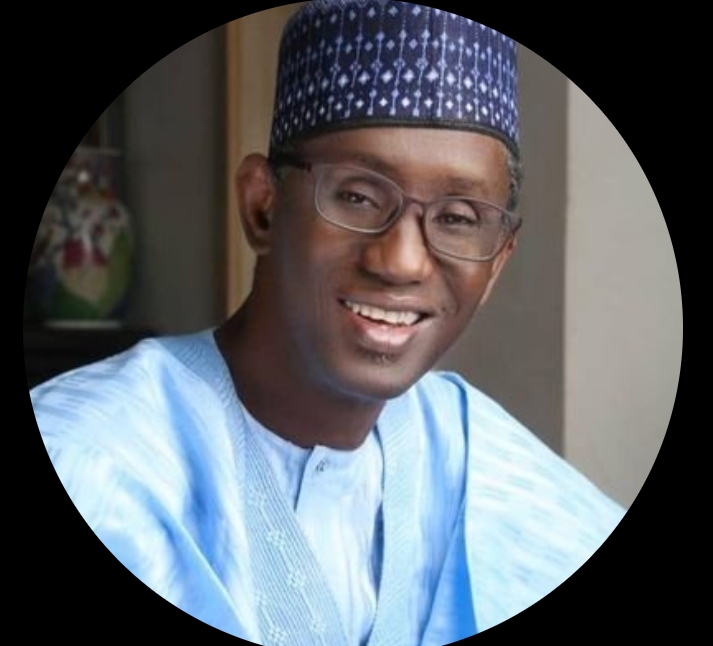
By Kayode Sanni-Arewa
The Federal Capital Territory (FCT) Police Command has initiated a search following the theft of a black Toyota Hilux vehicle belonging to the Office of the National Security Adviser (ONSA), Nuhu Ribadu, which was stolen during Friday’s Juma’at prayers in Abuja.
It was gathered that the vehicle was parked around 1:05pm opposite the Abuja Municipal Area Council (AMAC) complex in Area 10, while the official attended prayers at a nearby mosque.
Security source, Zagazola Makama, disclosed the incident via his X (formerly Twitter) handle, revealing that the ONSA official returned from the mosque only to find the vehicle missing.
According to him, a sources said the theft was immediately reported to the Garki Police Division at approximately 2:00 p.m., leading to a swift response by law enforcement.
Meanwhile, the FCT Police Command promptly activated a stop-and-search operation at various checkpoints and across all entry and exit points in the capital city.
Police authorities confirmed that investigations are ongoing and all efforts are being made to apprehend the culprits and recover the vehicle.
The Command said it had intensified efforts to track down the fleeing suspects and recover the stolen Hilux.
News
Governor Kefas Inaugurates Taraba State Investment International Summit Committee+Photos
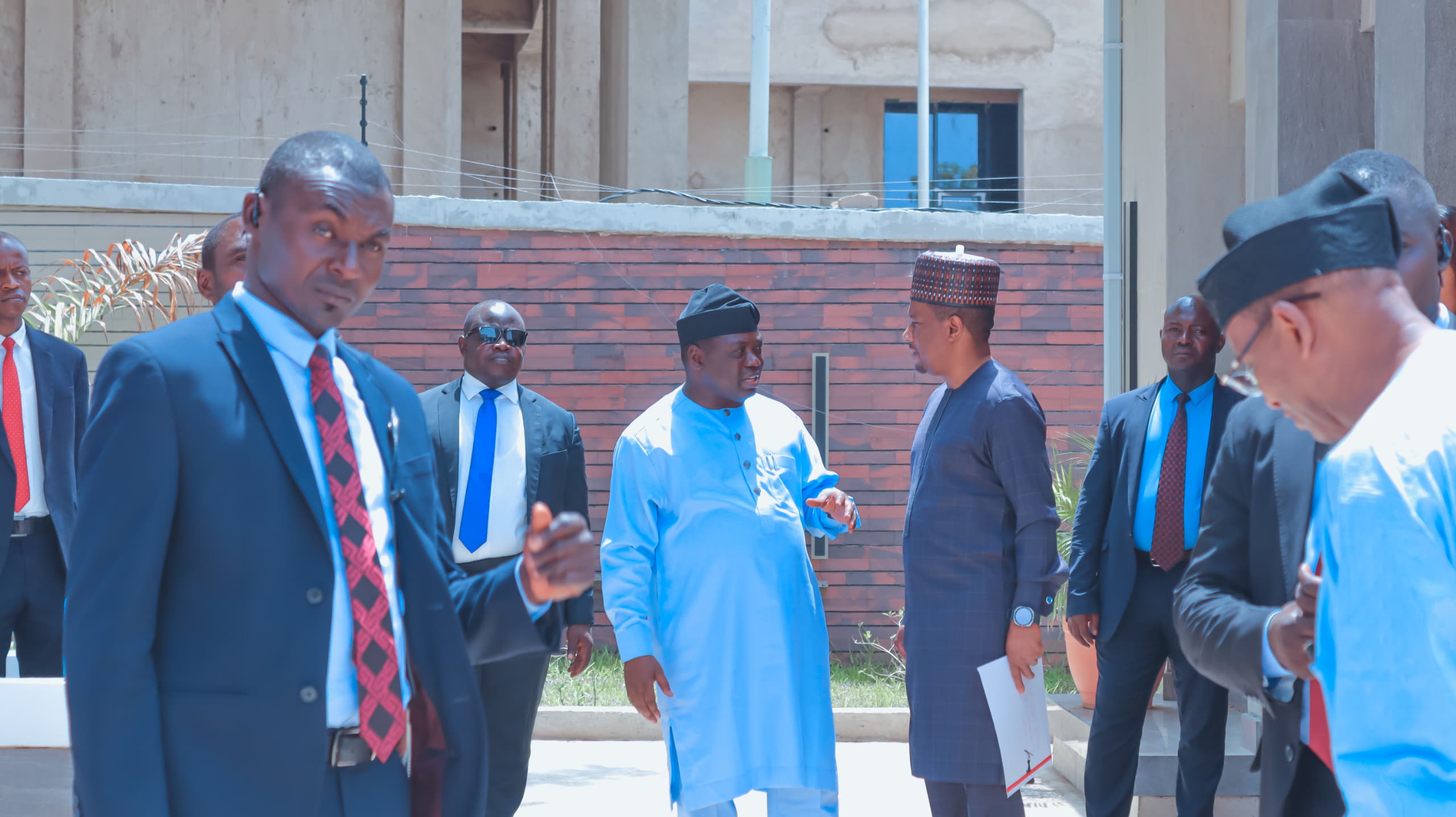
In a significant step towards enhancing investment opportunities in Taraba State, Governor Dr. Agbu Kefas on Saturday inaugurated the Committee for the International Investment Summit at the Executive Chamber of the Government House in Jalingo.
Senator Manu Haruna, former deputy governor of Taraba State and a serving Senator, a seasoned administrator who chairs Taraba State Mobilization and development Investment Committee expressed gratitude to Governor Kefas for his visionary leadership in organizing an international summit aimed at attracting investment to the state.
He highlighted the potential this initiative holds for fostering economic growth and development in Taraba State.
Rt. Hon. Ndudi Elumedu the Chairman of the Taraba State International Investment Summit Committee, emphasized that such summits are crucial for stimulating economic activities and creating opportunities..
According to him, the summit will play a vital role in showcasing Taraba’s investment potential, thereby attracting both local and international investors.
The committee is expected to work diligently to prepare for the summit, ensuring that it positions Taraba State as a favorable destination for investment and economic collaboration.
Governor Kefas remains committed to promoting policies that support economic diversification and sustainable 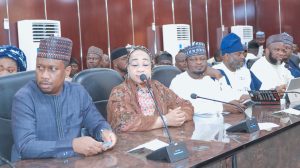
This inauguration marks a positive development in Taraba’s ongoing efforts to enhance its economic landscape and improve the standard of living for its residents.
News
OERAF Rounds Up Late Chief Ekuogbe Rowland Akpodiete’s remembrance with Novelty Match
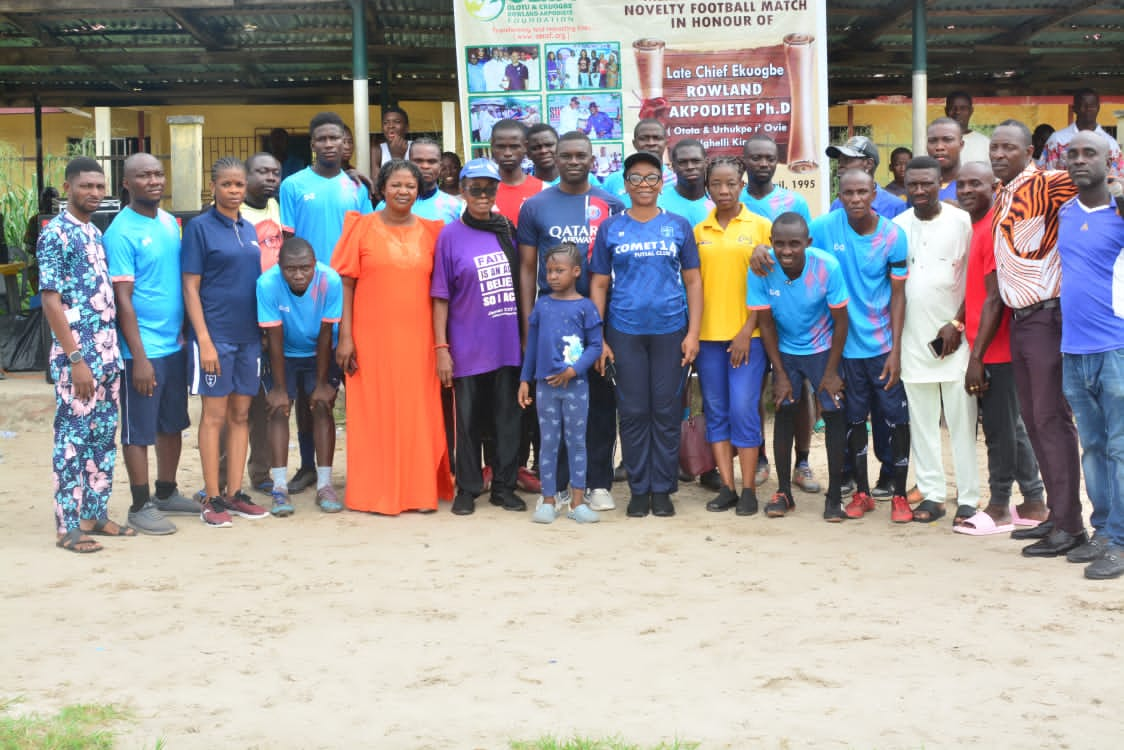
By Kennedy Atevure
Olotu & Ekuogbe Rowland Akpodiete Foundation (OERAF) rounded up the remembrance of late Chief Ekuogbe Rowland Akpodiete, Ph.D., with a novelty match at Ughelli Public Field on April 11, 2025.
Speaking shortly after the match, Dr. Olotu Otemu Akpodiete appealed to the Ughelli North Local Government Council Vice Chairman’s representative for the council to upgrade the field to a mini stadium.
Dr. Akpodiete stressed that Ughelli Public Field has been in existence since before the state government built the Ughelli Township Stadium.
The novelty match, which ended in a 1-1 draw, thrilled everyone who watched it.
The team of the children of late Chief Ekuogbe Rowland Akpodiete, Ph.D., scored the first goal, which was equalized by the grandchildren’s team through a penalty kick.
Dignitaries present during the novelty match included Hon. Chief (Mrs.) Meg Atano, Ughelli North Local Government Council Vice Chairman, ably represented by Pst. (Mrs.) Rita Nyewhoema; Evang. Nicolas Evwienure; Mrs Efe Akpodiete -Minabowan Barr. Agboka Akpodiete-Omale; Hon . Felix Uloho, Chief Grace Akpodiete; and Mr. Kennedy Otega (Big Daddy), among others.
Other highlights of the event included the presentation of cash prizes to both teams and a group photograph with light refreshments.
-

 News23 hours ago
News23 hours agoConstituents Drag Akpabio, Senate to Court Over Suspension of Natasha
-
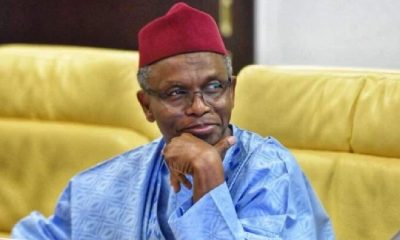
 News9 hours ago
News9 hours agoWe only had lunch with Buhari not 2027 politics -El-Rufai
-

 News22 hours ago
News22 hours agoFCT minister, Wike gives land allotees 21 days to pay or lose offer
-

 News9 hours ago
News9 hours agoSad! Explosion rocks Lagos
-

 News10 hours ago
News10 hours agoParts of Abuja, Niger in total darkness -AEDC confirms
-
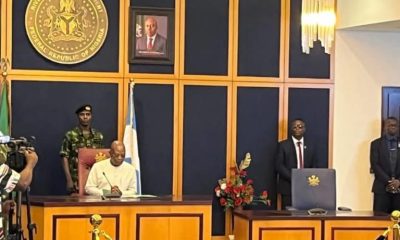
 News8 hours ago
News8 hours agoIbas gives reasons why Sole Administrators were appointed for Rivers councils
-

 News8 hours ago
News8 hours agoUS embassy announces new requirements for visa interviews for Nigerian applicants
-
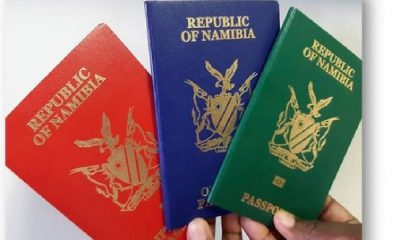
 News7 hours ago
News7 hours agoFive countries with easy work visas in 2025














